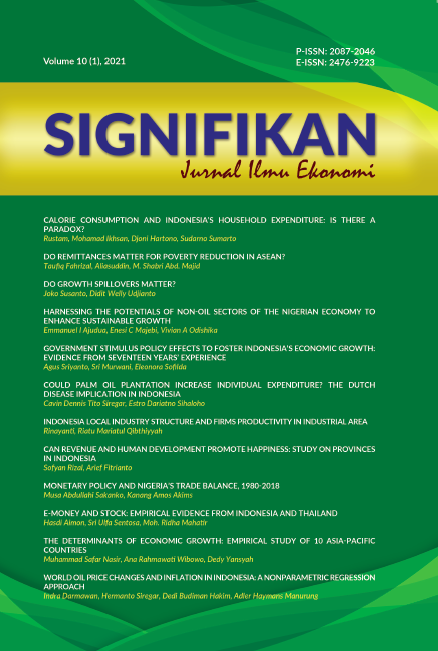Can Revenue and Human Development Promote Happiness: Study on Provinces in Indonesia
DOI:
https://doi.org/10.15408/sjie.v10i1.17600Keywords:
Easterlin Paradox, Happiness, Economic DevelopmentAbstract
This study seeks to see the relationship between the human development index (HDI) and gross regional domestic product (GRDP) variables on the happiness of economic growth data for provinces in Indonesia. The method used in this research is regression and path analysis. This study proves that happiness is not caused by the income (GRDP) of a region but rather significantly by one of the dimensions of HDI, namely the education dimension. The relationship through the variable between using path analysis through the indirect effect of the GRDP intermediary also significantly affects the education dimension. About 60% of the variable quality of education plays a role in happiness. If the effect is through an intermediary variable, the real influence of the variable quality of education on happiness is 65%. Other variables such as health and economy, directly or indirectly, do not significantly affect the level of happiness.
JEL Classification: I3, E5, R10
How to Cite:
Rizal, S., & Fitrianto, A. (2021). Can Revenue and Human Development Promote Happiness: Study on Provinces in Indonesia. Signifikan: Jurnal Ilmu Ekonomi, 10(1), 113-128. https://doi.org/10.15408/sjie.v10i1.17600.
References
Bartolini, S., & Sarracino, F. (2011). Happy for How Long? How Social Capital and GDP Relate to Happiness over Time. Working Paper No. 2011-60, LISER.
Becker, G. S., Philipson, T. J., & Soares, R. R. (2005). The Quantity and Quality of Life and the Evolution of World Inequality. American Economic Review, 95(1), 277-291.
Behzad, D. (2002). Social Capital as a Bed for Promoting Mental Health. Seasonally Magazine of Social Welfare, 2(6), 1-15.
Blanchflower, D. G., & Oswald, A. J. (2004). Well-being Over Time in Britain and the USA. Journal of Public Economics, 88(8), 1359-1386.
Blanchflower, D., & Oswald, A. (2008). Is Well-being U-Shaped Over The Life Cycle?. Social Science and Medicine, 66(8), 1733-1749.
Coleman, J. S. (1988). Social Capital in The Creation of Human Capital. American Journal of Sociology, 94, 95-120.
Costanza, R., Hart, M., Posner, S., & Talbert, J. (2009). Beyond GDP: The Need for New Measures of Progress. Pardee Paper No. 4. Pardee Center for the Study of the Longer-Range Future, Boston, MA.
Deaton, A., & Stones, A. A. (2013). Two Happiness Puzzles. American Economic Review, 103(3), 591-597.
Dolan, P., Peasgood, T., & White, M. (2008). Do We Know What Makes Us Happy? A Review of The Economic Literature on The Factors Associated with Subjective Well-Being. Journal of Economic Psychology, 29(1), 94-122.
Dorn, D., Fischer, J., Kirchgassner, G., & Sousa-Ponz, A. (2007). Is it Culture or Democracy? The Impact of Democracy, Income, and Culture on Happiness. Social Indicators Research, 82(3), 505-526.
Easterlin R., & Angelescu L. (2009). Happiness and Growth The World Over Time-Series Evidence on The Happiness-Income Paradox. IZA Discussion Paper No. 4060.
Frey, B. S., & Stutzer, A. (2002). What Can Economists Learn from Happiness Research?. Journal of Economic Literature, 40(2), 402-435.
Gerdtham, U. G., & Johannesson, M. (2001). The Relationship Between Happiness, Health, and Socio-economic Factors: Results Based on Swedish Microdata. Journal of Behavioral and Experimental Economics, 30(6), 553-557.
Ghamari, M. (2012). The Relationship of Social Capital and Happiness Among High School Students of Karaj City. International Journal of Academic Research in Business and Social Sciences, 2(1), 353-363.
Helliwell, J. F., Barrington-Leigh, C. P., Harris, A., & Huang, H. (2009). International Evidence on the Social Context of Well-Being. NBER Working Paper No. 14720.
Hundley, G. (2001). Why Women Earn Less Than Men in Self-Employment. Journal of Labor Research, 22(4), 817-829.
Inglehart, R., Foa, R. Peterson, C., & Welzel, C. (2008). Development, Freedom and Rising Happiness: A Global Perspective 1981-2006. Perspectives on Psychological Science, 3(4), 264-85.
Kahneman, D., & Deaton, A. (2010). High Income Improve Evaluation of Life but Not Emotional Well-being. Proceedings of the National Academy of Sciences, 107(38), 16489-16493.
Kawachi, I., Kennedy, B. P., Lochner, K., & Prothrow-Stith, D. (1997). Social Capital, Income Inequality, and Mortality. American Journal of Public Health, 87(9), 1491-1498.
Kessler, R. C. (1997). The Effects Of Stressful Life Events on Depression. Annual Review of Psychology, 48, 191-214.
Majeed, M. T., & Ajaz, T. (2018). Social Capital as a Determinant of Population Health Outcomes: A Global Perspective. Pakistan Journal of Commerce and Social Sciences, 12(1), 52-77.
Majeed, M. T., & Liaqat, R. (2019). Health Outcomes of Social Inclusion: Empirical Evidence. Pakistan Journal of Applied Economics, 29(2), 201-242.
Majeed, M. T., & Samreen, I. (2021). Social Capital as a Source of Happiness: Evidence From Across-Country Analysis. International Journal of Social Economics, 48(1), 159-179.
Meier, S., & Stutzer, A. (2008). Is Volunteering Rewarding in Itself?. Economica, 75(297), 39-59.
Oswald, A. J. (1997). Happiness and Economic Performance. Economic Journal, Royal Economic Society, 107(445), 1815-1831.
Sen, A. (2001). Development As Freedom. New York: Oxford Press.
Stack, S., & Eshleman, J. R. (1998). Marital Status and Happiness: A 17-Nation Study. Journal of Marriage and the Family, 60(2), 527–536.
Tella, D. R., & MacCulloch, R. (2007). Happines, Contentment and Other Emotions for Central Banks. NBER Working Paper No. 13622. https://doi.org/10.3386/w13622.
Tella, D. R., & MacCulloch, R. (2008). Gross National Happiness as an Answer to the Easterlin Paradox?. Journal of Development Economics, 86(1), 22-42.
Veenhoven, R. (1991). Questions on Happiness: Traditional Topics, Modern Answers, Blind Spots. In Strack, F., Argyle, M. and Schwarz, N. (Eds). Subjective Wellbeing, an Interdisciplinary Perspective, 7-26. London: Pergamon Press.
Veenhoven, R., & Choi, Y. (2012). Does Intelligence Boost Happiness? Smartness of All Pays More Than Being Smarter Than Others. International Journal of Happiness and Development, 1(1), 5-27.

